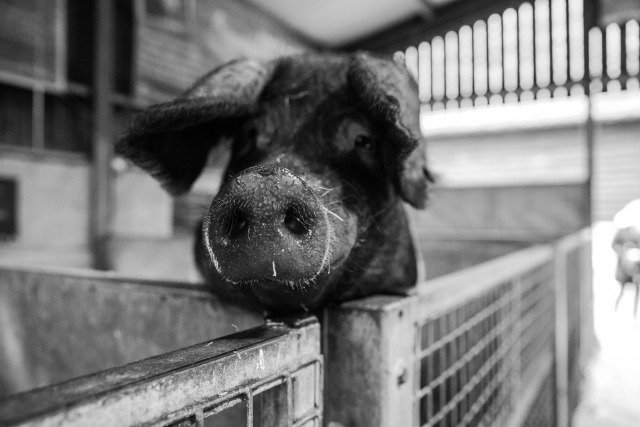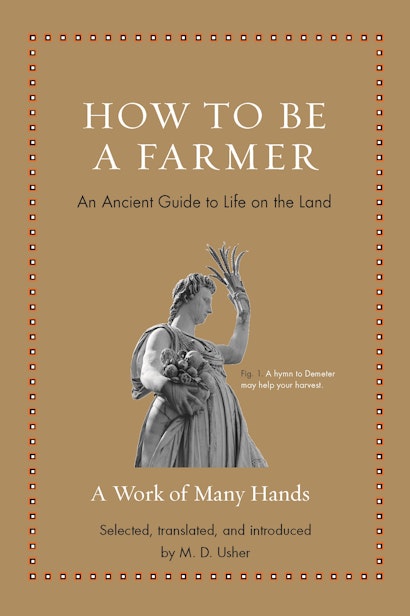The first thing to know about pigs is that they are not vegetarians. They are omnivores and their food choices pose no ethical dilemmas for them. Left to their own devices, pigs will readily eat meat. They will eat pork. They will even eat people. If you’ve ever seen the Guy Ritchie film Snatch, starring Brad Pitt, you’ll know what I’m talking about. For those who haven’t seen it, there’s a scene where a boxing fixer/London crime kingpin, played by the inimitable Alan Ford, feeds snitches and chronic debtors to his pigs. And it’s not just a fanciful plot element in screenplays. There are documented cases of farmers who’ve had heart attacks or seizures whilst cleaning out the pigsty, later to be discovered and identified only by their dental fillings or wedding rings. But enough of the macabre.
Instead, let me offer some lighter and loftier thoughts on Plato’s Republic, specifically that part of the treatise (369b-376e) where Glaucon likens Socrates’s “First City”—a polity he describes as “true” (alēthēs), and “healthy” (hugiēs), one characterized by communitarian values and vegetarian simplicity—to a city fit only for pigs (huōn polis). I hope at least partially to answer two questions here: Why pigs? And, relatedly, why the plant-based diet, which is so much at the forefront of thinking these days about sustainable living in the new climatic regime?
SimCity
Plato’s First City is a simulation of civic origin. Socrates and his interlocuters begin by enumerating the fundaments of human life—food, shelter, clothes—and the practitioners necessary to provide such essentials: farmer, carpenter, weaver, cobbler, and, interestingly, medical doctor. Four or five persons minimally, Socrates surmises (with faux naïvité), are required to constitute a city. The fully developed community will be diverse and multifaceted but, it is expressly said, “not particularly large.” There will be wage earners (misthōtoi), but, because no war, no slaves. The quality of its citizens’ life together rivals the serene mise-en-scène of Edward Hicks’s iconic Peaceable Kingdom paintings: “They will produce bread, wine, clothing, and shoes,” Socrates says. “Once they’ve built houses and households, they’ll work naked and barefoot in summer, but be appropriately clad and shod in winter. For food, they’ll knead barley meal into cakes and bake wheat flour into loaves. They’ll lay their noble cakes and loaves on makeshift reed mats or clean leaves. Then,” he adds with a touch of quaintness,
reclining on couches strewn with bryony and myrtle, they’ll feast with their children, drink wine after dinner, and, crowned with garlands, sing hymns to the gods. They’ll take pleasure in sex with one another but, as a precaution against poverty or war, they will not produce children beyond their means.
Glaucon sarcastically objects that there is no culinary refinement in this idyllic “feasting.” To which Socrates replies:
Naturally they’ll put salt, olives, cheese, and vegetables—both foraged and cultivated—into the kind of boiled dinners folks cook in the country. We’ll provide them with desserts, too, I suppose, comprised of figs, chickpeas, and beans; and they’ll roast acorns and myrtle berries at the fire, sipping wine in moderation. And so they’ll live in peace, with good health, so it seems. And when they grow old and die, they’ll pass on to their progeny a way of life (bios) just like the one they themselves enjoyed.
Socrates, it is worth pointing out, is yanking Glaucon’s chain in this response with a play on the word opson—the culinary refinement that Glaucon finds wanting in Socrates’s peaceable kingdom. “Will they feast without cuisine [aneu opsou]?” Glaucon asks. Opson can denote any cooked dish but is used primarily of cuisine prepared with meat or fish. It can also refer by metonymy to the seasoning, sauce, or flavoring that makes a dish distinctive. (Think mint jelly with lamb, or tzatziki with souvlaki.) Glaucon had meant the word in its primary sense—a gourmet dish cooked with meat or fish—but Socrates replies with a description of a perfectly good opson, so far as definitions go—a simple vegetarian casserole. This prompts Glaucon to object again that this is still a city fit only for pigs, to which Socrates reacts with feigned surprise: “I see,” he says. “It’s not just a city you’re after, but a luxurious city,” the list of the requirements for which is not short, he says, but must include, at the very least: perfumes, incense, prostitutes, and pastries; and, as for additional professions: swineherds—ironically—and game hunters (to provide the meat the city for pigs lacks), and painters, poets, actors, general contractors, barbers, dancers, chefs, more doctors, and nannies, among others, making the city far larger, verging, indeed, on overpopulation.
Why Pigs?
Pigs, like dogs, were theriomorphs of traditional reproach for the ancient Greeks. With characteristic cheek, however, Plato redeems both. Elsewhere in the Republic, for example, he calls the dog the “most philosophic” of animals because it recognizes in an instant what belongs in its orbit and what does not—its master, for example, as opposed to an intruder. Plato even derives the name of his precious Guardian class from the young dog’s natural pre-eminence at defence with a play on the words phulax (“guard”) and skulax (“puppy”). Similarly in Socrates’s tacit acceptance of Glaucon’s derisive description of the First City, Plato exonerates the pig. In fact, in the Statesman he calls the pig “that noblest and likewise most easy-going species.” As one scholar points out, appealing to the use of the adjective in Greek tragedy and elsewhere in Plato, “easy-going” (eucherēs) is primarily “a term of praise for the soldier or pioneer who easily puts up with the hard living and coarse fare which a spoiled and dainty palate disdains.” Glaucon’s response to Socrates, then, proclaiming his primitive State a city for pigs, involves a conventional joke about people as pigs with its obvious surface meaning. He intends derision, but Plato, approving of the moderation and temperance that such a lifestyle represents—that of the easy-going, adaptable, hardy, unfinical pig—concedes ironically to Glaucon’s objection and then proceeds to launch into a heuristic quest to discover Justice in the inferior contemporary city, sick, as it is, with luxury and fever. Plato’s favorable estimation of pigs is reminiscent of that adage of old folklore, sometimes attributed to Winston Churchill: “Cats look down on you; dogs look up to you; but pigs is equal.”
The Dietetics of Sustainability
The word “diet” derives from Greek diaita, a synonym for bios, meaning a way of life, the word used by Plato to describe the lifestyle of frugality and restraint that citizens of the First City bequeath as an inheritance to their descendants. I find it remarkable how Plato links diet to the durability of a stable society. Like Plato’s pigs, food in Plato’s First City is a metaphor. But there is no such thing as just a metaphor. The role food choice plays in the way a society is structured and organized stands for something other than itself, which is, I submit, for Plato, something akin to what we would call sustainability, what he calls “Justice,” namely mutual, reciprocal interdependence amongst citizens who use natural resources measuredly.
Food choices have consequences, whether in the fourth century BCE or in 2021. Plato seems keenly aware of this. The whole Republic hinges, in a very real sense, on Glaucon’s objection to a food choice. Per Plato’s account, the vegetarian frugality of the City for Pigs provides a buffer against territorial expansion and war, of the sort Athens itself had recently experienced in the Peloponnesian conflict with Sparta. Seen in that light, it is a form of enlightened self-interest and preservation.
We face similar exigencies today. A 2018 study published in the journal Nature drew international attention to the global consequences of food choice, documenting in close detail the urgency to adopt a plant-based diet. It was titled, tellingly, “Options for Keeping the Food System within Environmental Limits.” In casting an eye quickly over other historical moments other food responses to crises strike me as analogous to Plato’s. Here are three examples.
Masanobu Fukuoka was an agricultural scientist in pre-WWII Japan before getting conscripted into the army. His experiences working for the government on modernizing Japanese agriculture by introducing chemical fertilizers and machinery and being forced to fight for an imperialist regime impelled him to reject technological and industrial paradigms of progress and return to his family farm where he formulated an eclectic worldview and perfected no-till techniques of farming that he dubbed “do-nothing agriculture.” His book about this, The One Straw Revolution (1975), became a Bible for practitioners in the emerging permaculture movement.
Scott and Helen Nearing moved from New York City to Vermont, where they bought and resurrected a derelict farm at the height of the Great Depression. (This was long before anyone ever uttered the words “back-to-the-land” or “hippie.”) Scott was a trained economist and a Communist. He had endured a high-profile trial for treason in New York for his pacifism during WWI then managed to get himself kicked out of the Party for what its leaders called “mystic individualism.” He and Helen embarked on their Vermont homesteading project and a maple sugaring business when Scott was in his 50s. They documented their build-everything-yourself self-sufficient lifestyle twenty years later, in 1954, at the urging of their neighbor, Pearl S. Buck. That book was entitled Living the Good Life: How to Live Sanely and Simply in a Troubled World. The Nearings viewed diet as an agent of liberation from capitalism’s hegemonic control of labor. They ate only raw vegetables and viewed the keeping of livestock as tantamount to chattel slavery (for both farmers and animals). One of the longest chapters in their manifesto for the good life is entitled “Eating for Health.”
Finally, James Scott, a political scientist at Yale, makes the intriguing argument in his books Against the Grain: A Deep History of the Earliest States (2018) and The Art of Not Being Governed (2010) that ancient and contemporary peoples living on the fringes of agronomic civilizations, often seen as primitive or “left out” of the benefits of agriculture, in fact leverage their own food and lifestyle choices to keep civilization with its taxes and conscriptions at bay. Planting root crops using paleolithic slash-and-burn techniques in the mountains, for example, as opposed to growing rice or grains in the valleys, avoids taxation and/or usurpation by the State. (The logic of that being rice and grain are harvested seasonally, all at one time, and stored, so easy to confiscate or tax; tubers like taro and yams you harvest as you need them and can stay in the ground ready-to-eat for years.)
Sometimes food is just food. But just as often, as in Plato’s City for Pigs, food is metaphorical, or metonymic, standing in for something more than itself, something that is in its essence political.
M. D. Usher is the Lyman-Roberts Professor of Classical Languages and Literature at the University of Vermont, where he is a faculty member in the Environmental and Food Systems Programs and the Department of Geography. He and his wife, Caroline, have been farming for more than twenty years and they built, own, and operate Works & Days Farm, which produces lamb, eggs, and maple syrup in Shoreham, Vermont.

